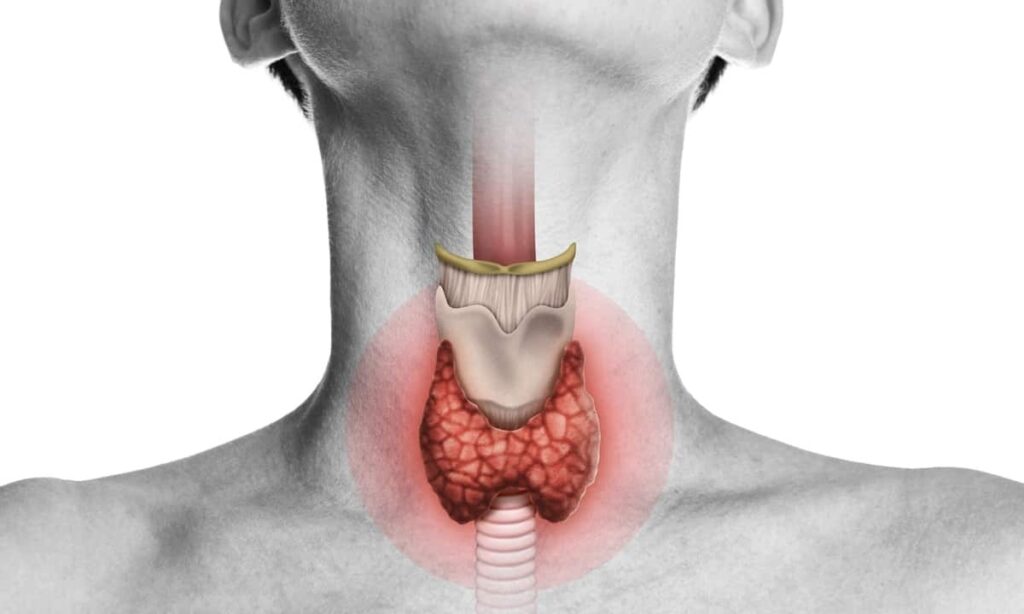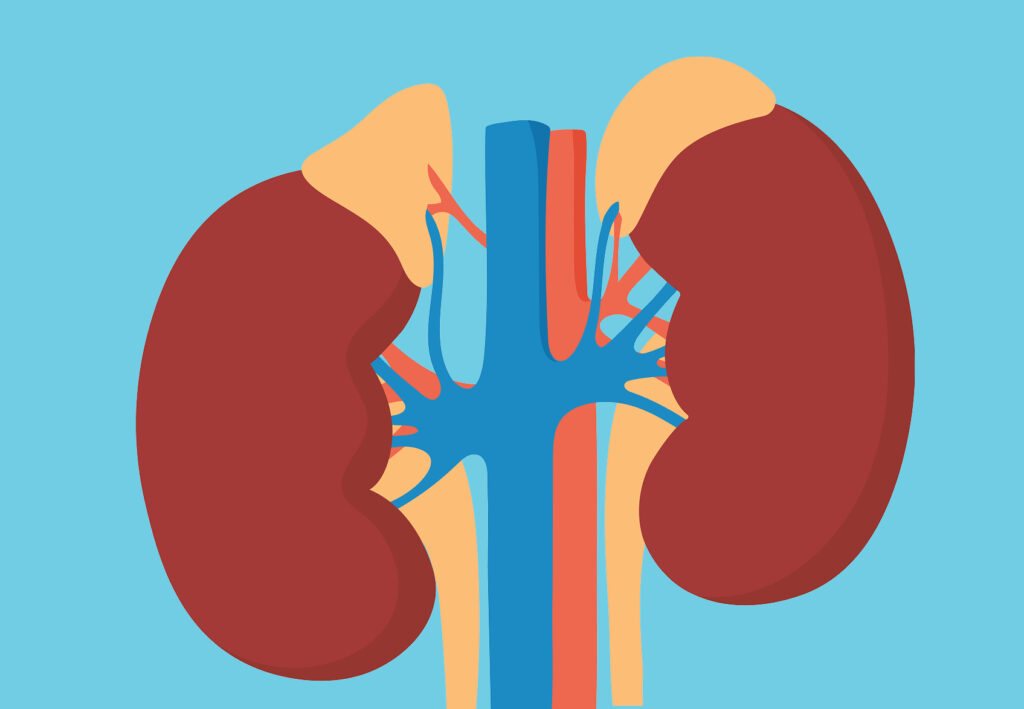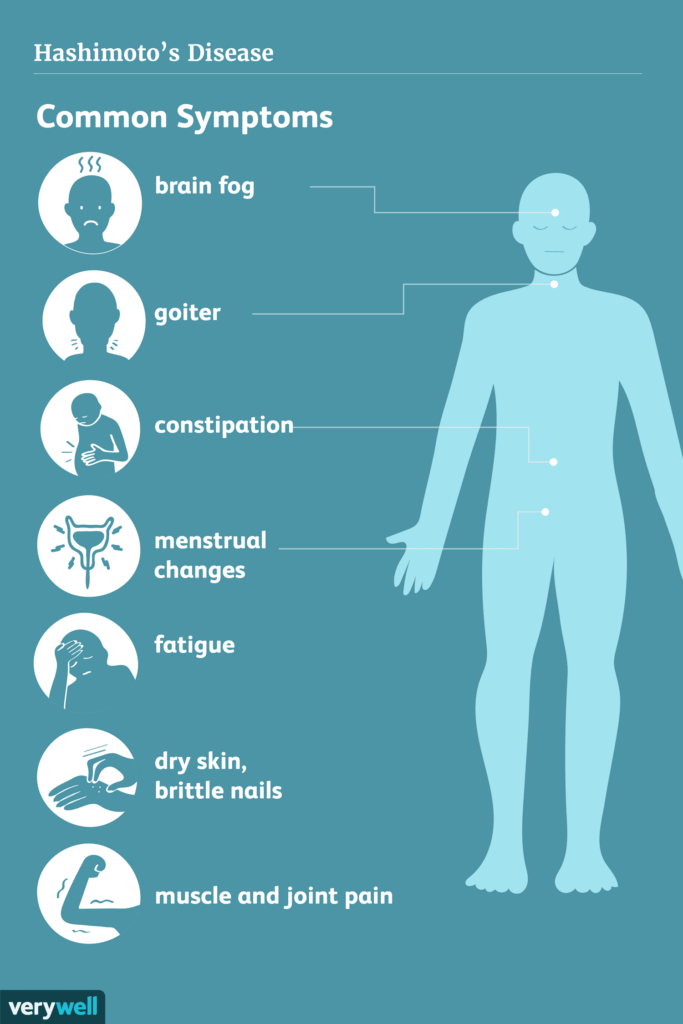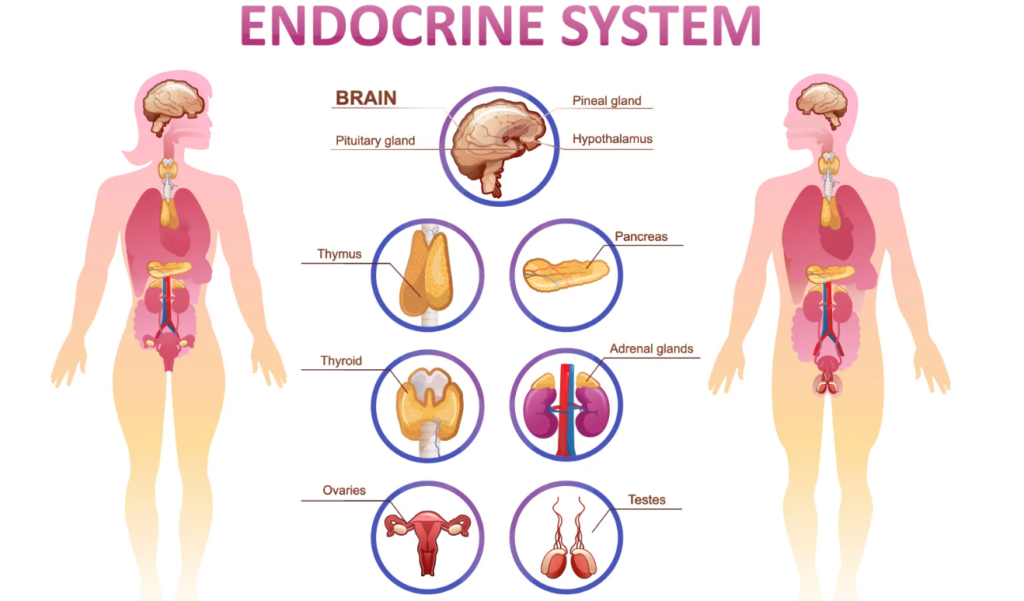The Impacts of Lyme Disease on the Endocrine System
The endocrine system describes a complex network of glands and organs that work together to control your body’s metabolism, energy levels, reproductive function, growth, and development. It also mediates your body’s response to stress and injuries. The thyroid and the adrenal glands are two major components of your endocrine system that can be significantly affected by Lyme disease.
Thyroid

The thyroid gland produces hormones that regulate the body’s metabolism, growth, and development. Without a properly functioning thyroid, we can experience extreme fatigue, brain fog, mood issues like anxiety or depression, trouble sleeping, weight loss or weight gain, hair loss, muscle weakness or pain, infertility, and irregular menstrual cycles.
The inflammatory cytokines that are produced in Lyme disease impact thyroid hormone signaling. This means thyroid-stimulating hormone (TSH) may decline. The conversion of T4 to T3 (the active thyroid hormone) can be reduced, leading to fatigue and low energy levels. Additionally, reverse T3 can become elevated. This version of T3 is inactive, but it can take up receptor sites, meaning active-free T3 is unable to bind to these same sites, resulting in hypothyroid symptoms like fatigue and weight gain.
The symptoms of hypothyroidism and Lyme disease can overlap and mimic each other. Lyme can also be a trigger for Hashimoto’s, an autoimmune-driven hypothyroidism that accounts for 90 percent of hypothyroidism cases. I’ll go into greater detail about Lyme disease as a Hashimoto’s trigger in a moment.
Adrenal Glands
The adrenal glands are part of the hypothalamic-pituitary-adrenal (HPA) axis, which is primarily responsible for our response to stress. The adrenals release cortisol in response to stressors and infections. Cortisol plays an anti-inflammatory role in our body and can help regulate the immune system.
Adrenal dysfunction (also known as HPA axis dysfunction) develops when we have chronic stress. This can be mental/emotional stress, but can also come from sleep deprivation or chronic infections. In the early stages of adrenal dysfunction, cortisol levels are consistently high. If stressors persist for a longer period of time, this leads to low levels of cortisol due to a negative feedback loop within the HPA axis. Both high and low levels of cortisol can be problematic for fighting infections. Many people with chronic illnesses have low cortisol levels.
Symptoms of adrenal dysfunction and Lyme disease can overlap or mimic each other. One might experience chronic fatigue, brain fog, joint pain, muscle weakness, or mood issues like anxiety or depression with either condition.
Normalizing cortisol to healthy levels may help with Lyme symptoms, and can help overall balance in the body. In working with chronic conditions, I’ve discovered that the adrenal glands often play a role in the development or exacerbation of symptoms and that supporting the adrenals can be a key part of reducing symptoms.
In my latest book, Adrenal Transformation Protocol, I provide my tried and true four-week program for adrenal support. It’s the result of over a decade of research, working with patients, and overcoming my own adrenal dysfunction (on three separate occasions!). It’s helped thousands of people improve symptoms of brain fog, anxiety, irritability, forgetfulness, joint pain, and trouble sleeping. Supporting the adrenals and balancing cortisol levels may help with symptoms of Lyme, and can provide overall support for the body in fighting current and future infections.
Sex Hormones
The thyroid and the adrenals can impact each other, and can also have an effect on other sex hormones in the body. If either or both of them are not functioning well, this can trickle down and cause hormonal imbalances, which can lead to PMS, irregular menstrual cycles, and infertility in women, not to mention all the symptoms associated with those conditions. Men can experience low levels of testosterone or high levels of estrogen, which can lead to symptoms like weight gain, fatigue, and brain fog.
The thyroid and the adrenal glands are two major components of your endocrine system that can be significantly affected by Lyme disease.
Dr. Izabella Wentz
Lyme as a Trigger for Hashimoto’s
Chronic infections can often be triggers for autoimmune disorders like Hashimoto’s, and eliminating infections can be hugely helpful for symptoms, and can even help people put their autoimmune disease into remission.

If you have Hashimoto’s and you’ve had difficulty going into remission, there is a significant chance that you have an infection. Up to 80 percent of my clients who don’t go into remission with dietary changes and supplementation like the gluten-free diet, have tested for one or more infections using functional medicine testing, and Lyme could be the culprit! I always ask my clients if they had spent time in the wilderness camping, hiking, or trail running before their diagnosis.
In addition to a chronic infection being a potential trigger for Hashimoto’s, it’s also very interesting to know that Borrelia burgdorferi (the bacteria that causes Lyme) has been found to have 16 protein structures that can cross-react with thyroid proteins (5 proteins that cross-react with the TSH receptor antibodies, 2 that cross-react with thyroglobulin antibodies, 3 that cross-react with thyroid peroxidase antibodies, and 6 that cross-react with the sodium iodide symporter).
This is known as molecular mimicry and is one of the leading theories of autoimmune disease. In very simple terms, this theory means that our immune system begins to attack our thyroid gland because we are infected with a pathogenic organism (like a bacterium, parasite, or virus), that looks similar to components of the thyroid gland. The immune system remembers isolated protein sequences on the pathogen (rather than the entire DNA sequence of the pathogen) and then looks for similar-looking proteins as targets for an attack. If the proteins on the thyroid match the proteins the immune system remembers, then the thyroid will be targeted for attack as well. Therefore, the immune system attacks our thyroid glands due to a case of mistaken identity, when it is trying to attack an infection like Lyme!
Scientists have noted that in people with the right genetic sequence, an infectious agent that resembles the thyroid gland, can trigger Hashimoto’s.
Hashimoto’s (and autoimmune disease in general) is progressive, leading to more and more symptoms. The longer you have it, the more damage it can do. Additionally, some of the symptoms of Lyme can be similar to symptoms of Hashimoto’s: fatigue, memory problems, and hormonal changes.
What to Do if You Have a Thyroid or Hormonal Issue Triggered by Lyme Disease?
If you’re experiencing Lyme disease or associated thyroid or adrenal issues, there are a few things you can do to provide your body with the support it needs:
Adrenal Support
As I mentioned earlier, supporting the adrenal glands can be incredibly helpful in normalizing cortisol levels and giving the immune system a boost. Lyme disease can destabilize the immune system and lead to an influx of inflammation.
Healthy adrenal glands are needed to support the body’s fight against Lyme disease (and any other virus or infection). Healthy cortisol levels support the immune system, our mitochondria, and ATP production (i.e. our body’s main form of energy!).
When it comes to adrenal support, I like to start with the ABCs – adaptogens, B vitamins, and vitamin C:
- Adaptogens – These herbs supplement the body’s ability to deal with stressors, and can both tone down overactive systems and boost underactive systems.
- B Vitamins – These vitamins may become depleted during stress, and deficiencies have been linked to adrenal dysfunction.
- Vitamin C – This important antioxidant helps support the adrenals and the eradication of viruses.
In my book, Adrenal Transformation Protocol, I go into greater detail and provide you with many other strategies to support your adrenals and healthy cortisol levels. People who have completed the protocol come from a wide variety of health histories and backgrounds, and have seen impressive results, after only four weeks:
- 92% had reduced mental fog
- 89% reported reduced fatigue
- 89% reported reduced forgetfulness
- 86% reported reduced anxiety
- 85% felt less irritable
- 81% experienced less trouble sleeping
- 78% reduced feelings of depression
- 76% reduced their joint pain
Comprehensive adrenal support for Lyme disease can be incredibly supportive, and I highly recommend trying this protocol to optimize your cortisol levels.
Balance Thyroid Hormones
Bringing your thyroid hormones into balance and ensuring you have enough free T3 is helpful for overall support for energy, mood, and mitochondria. T3, also known as liothyronine, is the most physiologically active thyroid hormone. Low T3 levels can also impair our immune response, and lead to persistent brain fog, fatigue, and hair loss, among other symptoms.
Unfortunately, a thyroid diagnosis is often missed because conventional medicine practitioners don’t routinely utilize thyroid antibody tests, rather the main focus of testing relies on the TSH, Thyroid Stimulating Hormone, which can fall within the reference range despite an autoimmune process against the thyroid.
For a full thyroid panel, I recommend testing TSH, Free T3, Free T4, TPO antibodies, and TG antibodies.
If you and your doctor determine that you may benefit from thyroid medications, please note that some individuals may benefit from a T3-containing medication or a combination of T3/T4 medication. Most thyroid medications such as levothyroxine and Synthroid, only contain the T4 thyroid hormone, but since the conversion process of T4 to free T3 can be compromised in those with chronic illness, you may experience greater benefit with a medication that contains T3.
Stevia
Interestingly, stevia (yes, that natural sweetener you often see in foods today) may help with suppressing Borrelia burgdorferi, the bacteria that causes Lyme disease, at least in a petri dish! In one study, researchers evaluated the antimicrobial potential of whole-leaf stevia extracts against B. burgdorferi, by comparing the antimicrobial effect of stevia with three commonly used antibiotics (doxycycline, cefoperazone, and daptomycin). The results revealed that stevia was capable of eliminating the bacteria as effectively as the reported three-antibiotic combination treatment.
The study showed that alcohol-extracted stevia was more effective than powdered forms in eradicating Borrelia cells.
Strengthen Your Resilience
In my experience and observations, Lyme can persist because of the immunosuppression that can occur from mold exposure or excessive stress as in adrenal burnout.
Mold mycotoxins can decrease the body’s ability to fight off infections, and I generally recommend for those with a history of Lyme -and really everyone who wants to have a healthy body- to avoid water-damaged buildings, which harbor mold, to keep the immune system healthy. In the case that a person with Lyme is exposed to mold, they will often need a comprehensive protocol that involves identifying and addressing the source of exposure, supporting detox pathways, and using binders and antimicrobials to get the body back into a healthier immune response.
In my experience, supporting the adrenals is an important piece of balancing the immune response as well. My Adrenal Transformation Protocol supports a healthy immune response by focusing on supplements like vitamin C and S. boulardii, which is a beneficial yeast. S. boulardii is incredibly supportive of gut health and aids in the clearance of toxins and pathogens like mold.
For a complete guide on supporting the adrenals, I recommend checking out my full Adrenal Transformation Protocol.
Takeaway
Lyme disease can impact nearly every system in your body, and the way it can impact our hormones is complex. Adrenal and thyroid support can boost the immune system and help with overall hormonal balance in the body, and it can be incredibly helpful for those with Lyme disease.
About the Author
Dr. Izabella Wentz is a compassionate, innovative, solution-focused integrative pharmacist dedicated to finding the root causes of chronic health conditions. Her passion stems from her own diagnosis with Hashimoto’s thyroiditis in 2009, following a decade of debilitating symptoms.
As an accomplished author, Dr. Wentz has written several best-selling books, including the New York Times best-seller “Hashimoto’s Thyroiditis: Lifestyle Interventions for Finding and Treating the Root Cause,” the protocol-based #1 New York Times best-seller “Hashimoto’s Protocol: A 90-Day Plan for Reversing Thyroid Symptoms and Getting Your Life Back,” and the Wall Street Journal Bestseller “Hashimoto’s Food Pharmacology: Nutrition Protocols and Healing Recipes to Take Charge of Your Thyroid Health.”
Her latest book, “The Adrenal Transformation Protocol,” is set to be released on April 18th, 2023. The book focuses on resetting the body’s stress response through targeted safety signals and features a 4-week program that has already helped over 3,500 individuals. The program has an impressive success rate, with over 80% of participants improving their brain fog, fatigue, anxiety, irritability, sleep issues, and libido.







